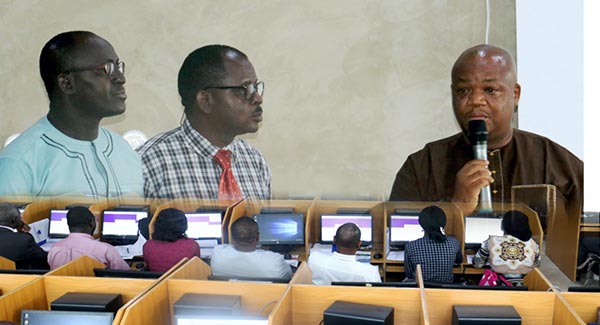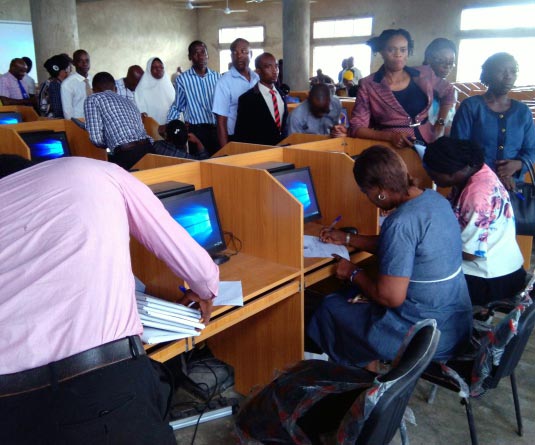The Nigerian Communications Commission (NCC) on Monday, 20th May, 2019 commenced a 5-day Computer Training Programme tagged the “Advanced Digital Appreciation Programme for Tertiary Institutions” (ADAPTI) for the Teaching and Non-Teaching Staff of the University. The training which was handled by the Digital Bridge Institute (DBI), the Research Arm of the Commission was in line with the mandate of NCC in promoting e-culture in Nigerian tertiary institutions.

addressing the participants during the Training
Declaring the training open at the 3,000 capacity new ICT Building, the Vice-Chancellor, Prof. Ganiyu Olatunji Olatunde, who was represented by the Registrar, Mr. Femi Ogunwomoju lauded the efforts of the NCC at ensuring that tertiary institutions in Nigeria were manned by qualified computer literate and efficient personnel. According to him, this will translate into high productivity, cost effectiveness and swift delivery of services. He disclosed that training and retraining of staff of the University had been a policy of the current management as it placed high premium on capacity building of its Commenting on the expected facilities required from beneficiary institutions such as, Olabisi Onabanjo University, Prof. Olatunde said he was never in doubt of the University’s readiness for the training, as one of the major pre-requisites for the exercise was “a standard training hall”. The Vice-Chancellor stated that the space which the University had was more than enough, adding that the whole building when fully ready will accommodate about 3,000 users at a time. He, thereafter, reassured the instructors of the readiness and co-operation of the staff of the University, nominated for the training exercise.

In his response, the Training Team Leader, Mr. Tobi Durojaye in company of other instructors, Mr. Bayo Olanrewaju and Mr. Uche Nnadi expressed satisfaction over the readiness of the University in the provision of required facilities for the training, especially, the large ICT hall equipped with new sets of computers and accessories. He, specifically, commended the management of Olabisi Onabanjo University for its vision in putting in place such a large edifice on the campus, specially dedicated for ICT. The structure was described by Mr. Durojaye as one of the very few largest ICT buildings in the country.
While speaking on the drive behind the training programme, Mr. Durojaye disclosed that he was in OOU along with his colleagues on behalf of Digital Bridge Institute (DBI), a subsidiary of the Nigerian Communications Commission (NCC) to facilitate and actualise through adequate training, the NCC’s objective of equipping the academic and non-academic staff of tertiary institutions in the country with practical skills in Microsoft Word, Excel, Power Point software applications, and ‘Access to the Internet’ for improved productivity. The training, according to him, would be in five modules.
It is expected that at the end of the five-day training exercise, the 110 participants that were drawn from across various cadres among both teaching and senior non-teaching staff members of the University would have had adequate training in basic ICT Office productivity tools. These would include the intranet, internet, use of e-teaching and e-learning facilities as well as collaborations in course delivery among other tools. The NCC through its subsidiary would be adequately responsible for the administration and needs of the participants, including course delivery, course materials, feeding and Certificate of Participation subject to satisfactory performance at the End-of-Training Competency Test. These, the NCC emphasised would have equipped the participants with requisite ICT knowledge and skills which would, over time, be translated into improved teaching and work performance.

